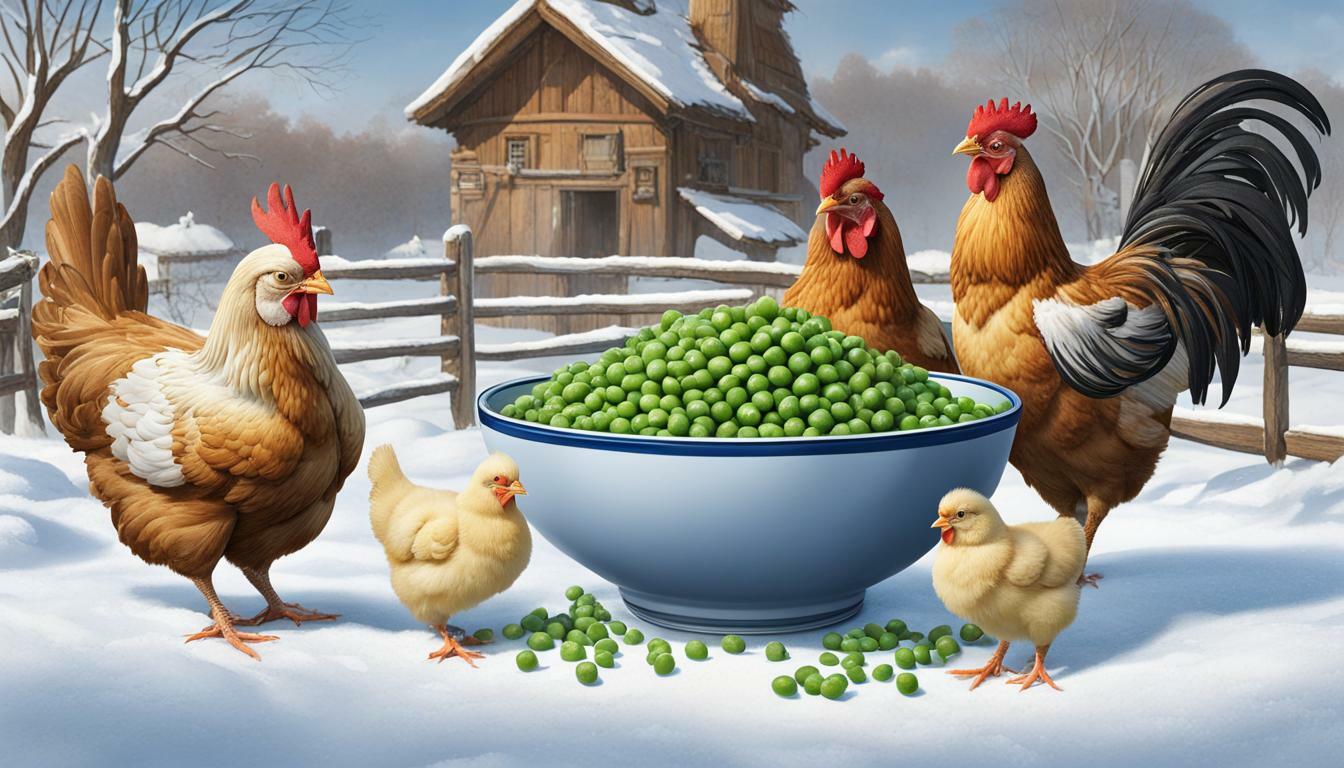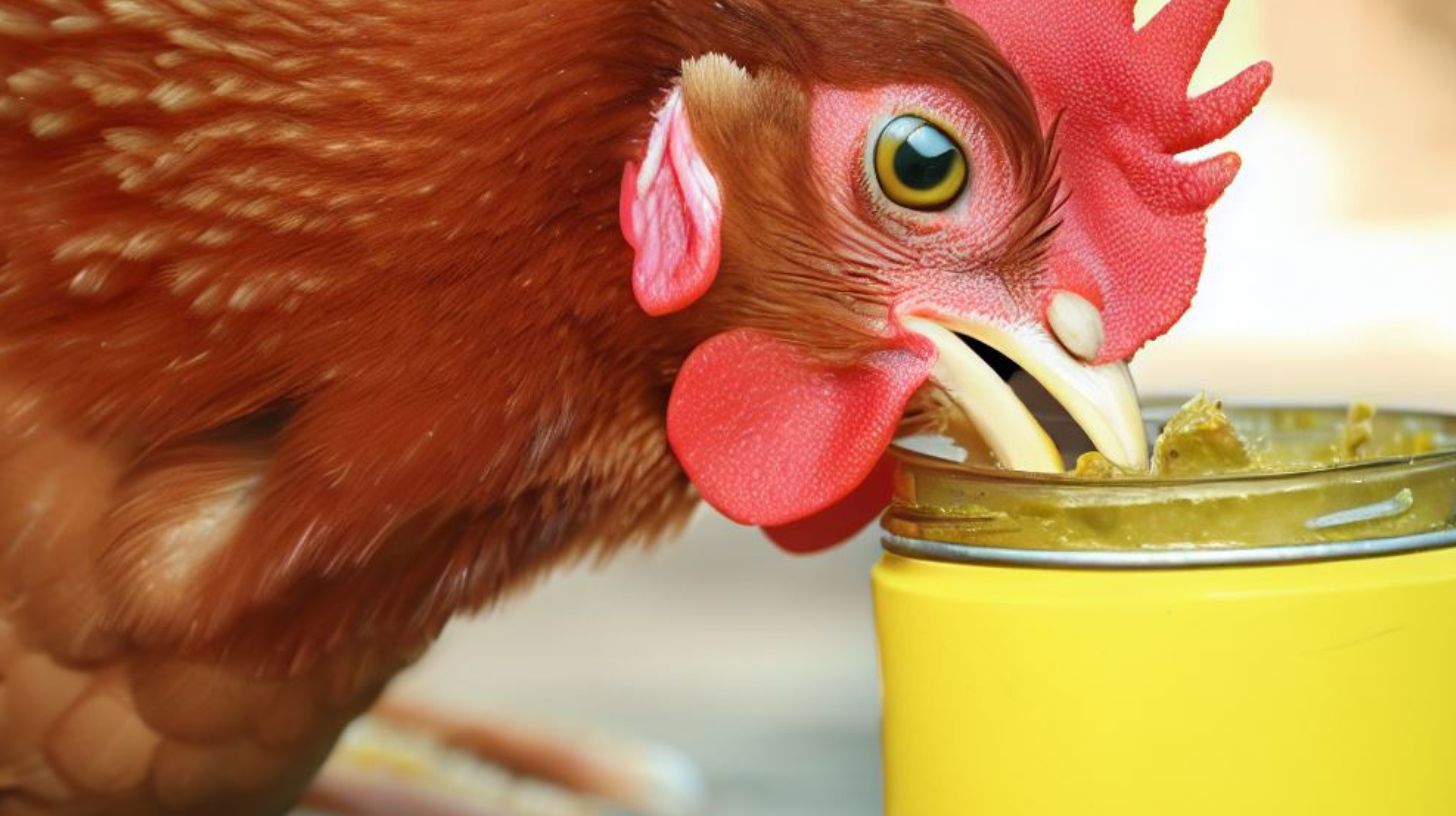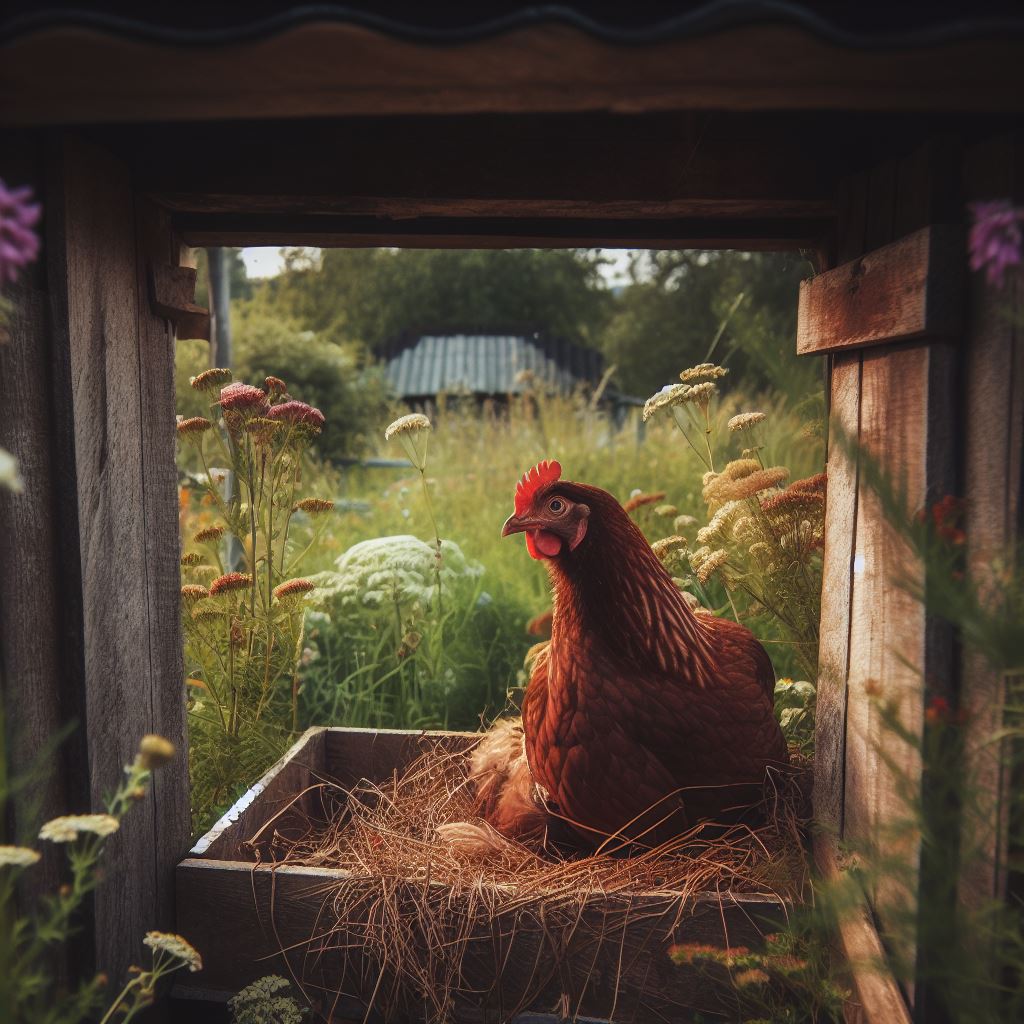Can Chickens Safely Eat Cheese? Benefits, Risks, and Tips
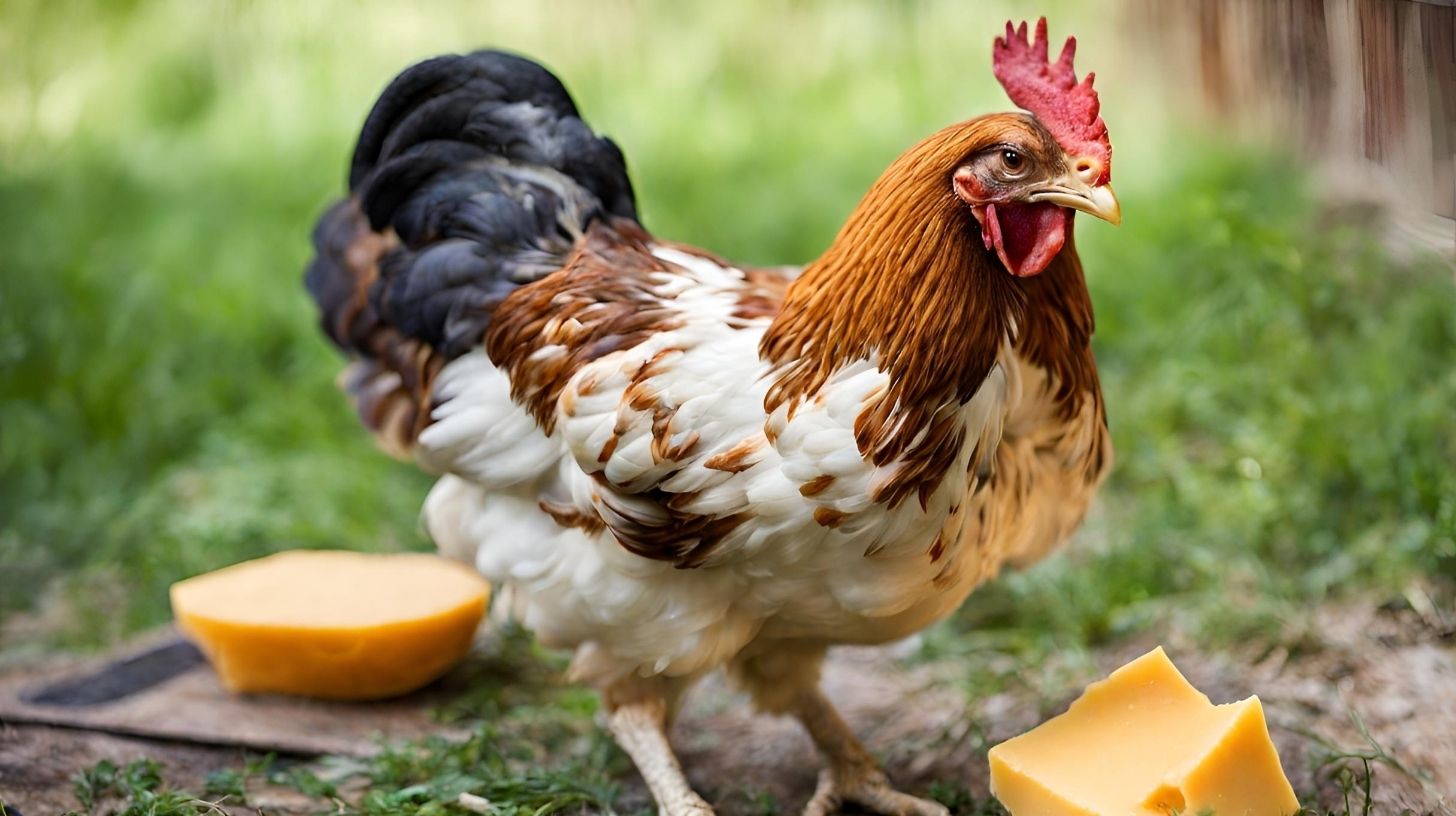
Table of content:
- An Overview of Chickens and Cheese
- What Kinds of Cheese Can Chickens Eat?
- Are Cheese Curds and Cheese Crackers Safe for Chickens?
- Can Chickens Eat Blue Cheese?
- How Much Cheese Can Chickens Eat?
- Are There Benefits to Feeding Chickens Cheese?
- Are There Risks to Feeding Chickens Cheese?
- How to Feed Cheese to Chickens
- Signs of Cheese-Related Health Issues in Chickens
- Can Chicks Eat Cheese?
- Can Roosters Eat Cheese?
- Frequently Asked Questions About Feeding Chickens Cheese
- Conclusion
Cheese can be an appealing treat for chickens, but can chickens eat cheese safely? As with any human food offered to chickens, moderation and common sense should prevail.
Key Takeaways:
- Chickens can eat some types of cheese in moderation as an occasional treat. Hard cheeses are lower in lactose and easier to digest.
- Too much cheese can cause digestive upset and diarrhea in chickens. Only feed small amounts.
- Avoid soft cheeses like brie due to safety concerns over bacteria growth. Also avoid blue cheeses due to mold content.
- Grated parmesan or cheddar sprinkled on feed can encourage picky eaters.
- Cheese should never make up more than 10% of a chicken’s diet. Their main diet should be comprised of layer feed and greens.
An Overview of Chickens and Cheese
Chickens are omnivores, meaning they can eat a variety of foods including some dairy products. Many chicken owners like to offer treats like scrambled eggs, yogurt, or cheese. But just because a food is edible doesn’t mean it’s necessarily healthy, especially in large quantities. When asking “can chickens eat cheese?” the answer is yes, but within limits.
Cheese and other dairy products contain lactose and fat. Lactose is a natural sugar found in milk that chickens have difficulty digesting. Feeding too much cheese to chickens can lead to digestive upset, diarrhea, dehydration, and nutritional deficiencies if their main diet is displaced.
However, small amounts of hard, aged cheeses like cheddar, parmesan, and swiss contain less lactose and can be fed to chickens as occasional treats without issue. These hard cheeses are lower in moisture and lactose, making them easier on a chicken’s digestive system.
So while chickens can eat cheese, proper portions and cheese choice makes all the difference. Read on for more specifics on how much and what kinds of cheese chickens can safely consume.
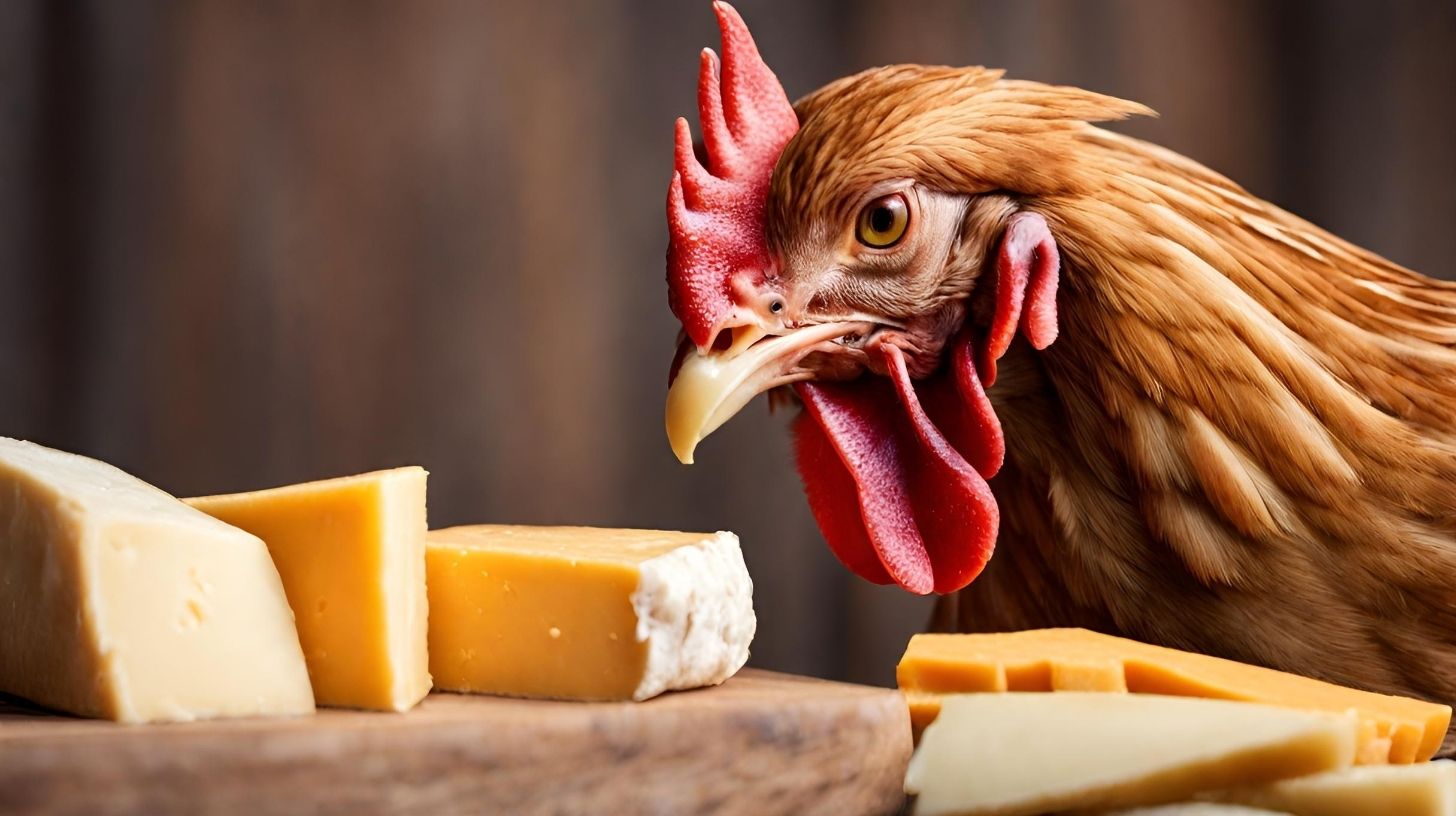 What Kinds of Cheese Can Chickens Eat?
What Kinds of Cheese Can Chickens Eat?
Not all cheeses are created equal when it comes to chickens. Here’s a breakdown of which varieties are safest and most digestible for chickens:
Hard Aged Cheeses
- Cheddar: One of the most popular options. A small amount of grated cheddar or cheddar cubes is safely enjoyed by chickens.
- Swiss: A good choice for chickens. Avoid any with holes which could pose a choking hazard.
- Parmesan: Grated parmesan sprinkled on feed can entice picky eaters. It’s a tasty treat when fed sparingly.
- Gouda: This semi-hard cheese is digestible for chickens when fed in moderation.
- Colby: Similar to cheddar, small amounts of this semi-hard cheese are chicken-safe.
- Monterey Jack: In small cubes or grated, this cheese makes a good treat.
- Asiago: The hard, aged variety can be fed to chickens in moderation.
Semi-Soft Cheeses
- Mozzarella: Fresh mozzarella cut into small pieces makes a suitable occasional snack.
- Cottage Cheese: The curds are affordable and convenient cheese treats for chickens.
- Ricotta: Small amounts of fresh ricotta are okay for chickens. Avoid feed whey-heavy varieties.
- Feta: Some chickens enjoy the tangy flavor of feta. Crumble into small chunks before feeding.
- Farmer’s Cheese: Also called “pot cheese,” this fresh cheese is mild enough for chickens.
Soft Cheeses to Avoid
- Brie: This cheese is too soft and prone to growing harmful bacteria like listeria. Avoid feeding to chickens.
- Blue Cheese: While some chickens seem to enjoy it, the mold content makes it a risky choice that’s best avoided.
- Goat Cheese: The soft texture and strong flavor of goat cheese can cause digestive upset in chickens.
- Cream Cheese: Too soft and rich for most chickens. Best to avoid this cheese.
- Neufchâtel: Similar risks as cream cheese, including richness and food safety issues. Don’t feed to chickens.
Are Cheese Curds and Cheese Crackers Safe for Chickens?
Beyond plain blocks of cheese, some owners want to know if by-products like cheese curds and cheese crackers are safe to feed. Here are some tips:
- Cheese Curds: Fresh cheese curds are digestible and make a handy training treat due to their small size. However, they are still high in fat so limit to a few pieces per chicken.
- Cheese Crackers: In moderation, plain cheese crackers make an acceptable treat. Avoid heavily seasoned varieties.
- Cheese Puffs: The high fat and carb content makes these a poor choice for chickens. Opt for healthier treats.
Can Chickens Eat Blue Cheese?
Blue cheese deserves special caution. Some chicken owners report their flock happily eating up blue cheese. However, there are a few risks to keep in mind:
- Mold content: Blue cheeses get their distinct flavor and veins from Penicillium mold spores added during processing. Consuming mold puts chickens at risk for developing fungal crop infections.
- Bacteria growth: The moisture content in blue cheese also encourages rapid bacteria growth when left out in warm temperatures, increasing the chances of chickens getting sick from spoiled cheese.
For these reasons, it’s safest to avoid feeding blue cheese to chickens. The risks outweigh potential benefits. Stick to hard, aged cheeses for a safer cheese treat.
How Much Cheese Can Chickens Eat?
When feeding cheese in moderation, follow these portion guidelines:
- Cheese should comprise no more than 10% of a chicken’s total daily diet.
- Offer cheese no more than 1-2 times per week as a special treat.
- Feed 1-2 cubes or 1-2 tbsp grated cheese per standard-sized chicken. Bantam breeds should get half these amounts.
- Avoid feeding cheese every day, even small amounts. The lactose and fat can lead to health issues long-term.
Remember that cheese should never completely replace formulated layer feed as a chicken’s primary diet. Some chicken owners make the mistake of overfeeding treats. While well-intended, this can lead to nutritional deficits and obesity.
Are There Benefits to Feeding Chickens Cheese?
In small amounts, cheese can provide some benefits including:
- Extra protein: Cheese contains protein from the milk it’s made from. This can complement the protein in layer feed.
- Added calcium: The extra calcium in cheese supports egg shell strength and bone health. But don’t overdo it.
- Encourages eating: Grated parmesan or cheddar sprinkled on layer feed can entice picky eaters.
- Healthy fats: Hard cheeses have healthy unsaturated fats. But too much fat can cause weight gain.
- Treat satisfaction: Chickens love treats! Cheese satisfies their foraging instincts.
While cheese has some positives, it’s vital chickens don’t fill up on cheese instead of their main diet. Cheese should be an occasional treat, not a staple.
Are There Risks to Feeding Chickens Cheese?
There are a few potential downsides to feeding chickens cheese, especially in excess:
- Digestive issues: The lactose in cheese can cause digestive upset, gas, diarrhea, and dehydration in chickens if they eat too much.
- Weight gain: Like humans, eating too much cheese can lead to obesity in chickens due to the high fat content.
- Listeria risk: Soft cheeses may harbor listeria bacteria which is harmful to chickens. This is especially true if cheese is left out and spoils.
- Reduced calcium absorption: While cheese contains calcium, excess amounts can actually inhibit a chicken’s ability to absorb calcium.
- Nutritional imbalances: If chickens fill up on cheese instead of feed, they may miss out on key minerals and vitamins needed for health.
To keep chickens healthy, cheese should be fed in small quantities no more than 1-2 times per week at most. Their main diet should still consist of complete layer feed and leafy greens. Monitor chickens closely when offering any treats like cheese to watch for signs of digestive upset or decreased appetite for regular feed. Discontinue cheese if any issues arise.
How to Feed Cheese to Chickens
Follow these tips for safely feeding cheese to chickens:
- Select harder, aged cheeses: Choose cheddar, parmesan, swiss, or gouda for the best digestibility and safety. Avoid soft, high-moisture cheeses prone to bacteria growth.
- Grate or cut into small pieces: Large cheese chunks pose a choking risk. Grating or dicing into 1/2 inch cubes is safer.
- Serve in moderation: No more than 1-2 tbsp grated or 2 cubes of cheese per standard-sized chicken, 1-2 times weekly at most. Adjust amounts for bantams.
- Feed as a supplement only: Ensure cheese is just a supplement. Layer feed and greens should still comprise the bulk of their diet.
- Avoid moldy cheeses: Don’t feed chickens moldy, spoiled, or “off” cheese since ingesting mold spores can cause crop infections.
Signs of Cheese-Related Health Issues in Chickens
Monitor how your flock reacts to cheese treats. Discontinue immediately if any adverse signs appear including:
- Watery, foul-smelling diarrhea
- Listlessness or lethargy
- Decreased feed intake
- Evidence of crop infection
- Weight gain or obesity
- Visible distress after eating cheese
Diarrhea and digestive upset are the most common signs of cheese intolerance. These symptoms should resolve within 24 hours if cheese is removed from their diet. Call a veterinarian if diarrhea persists or chickens show signs of illness.
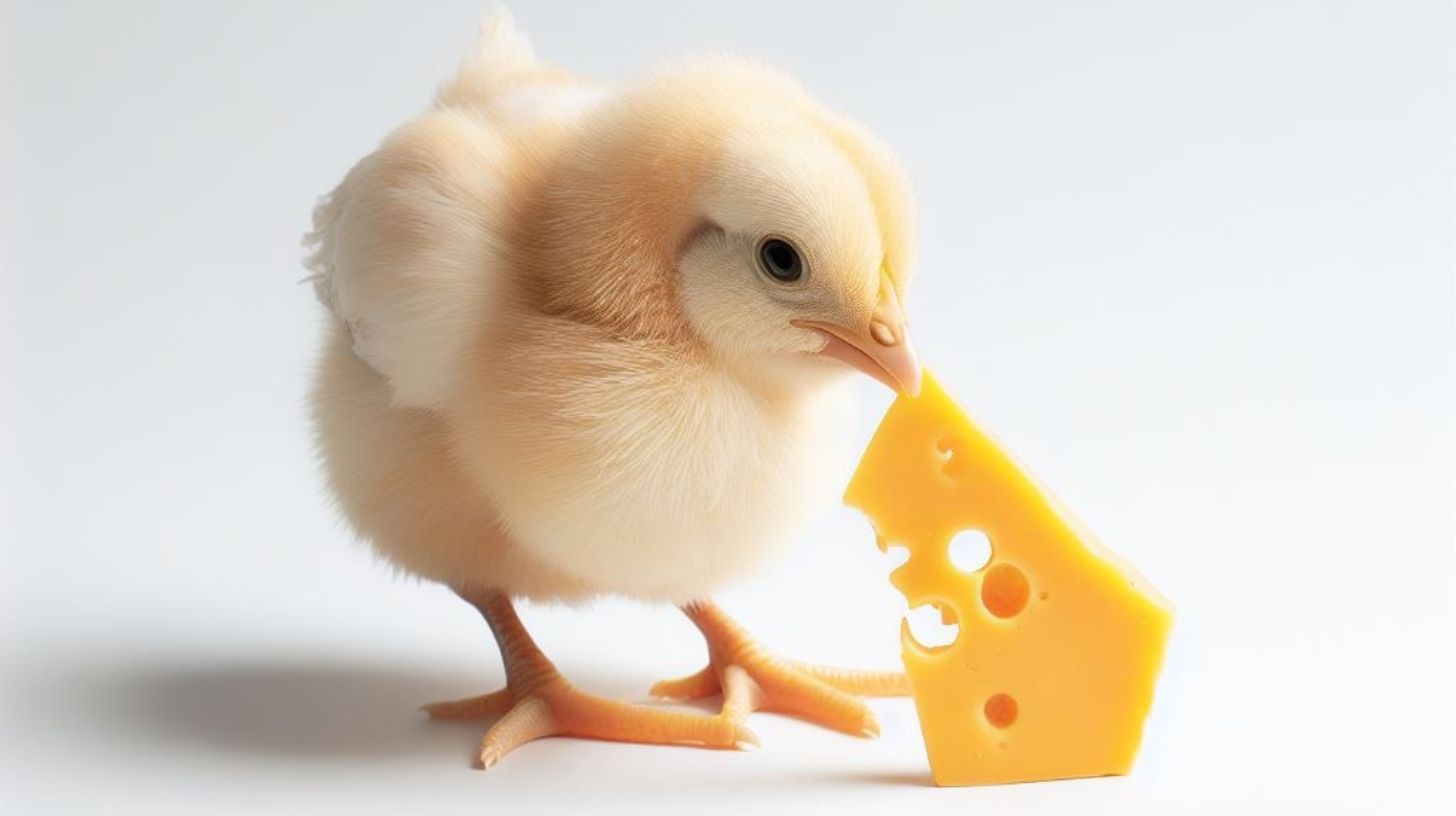 Can Chicks Eat Cheese?
Can Chicks Eat Cheese?
Baby chicks under 12 weeks old have sensitive digestive systems and undeveloped gut flora. For this reason, cheese and other dairy foods are not recommended for chicks. Wait until chicks are fully feathered and past the brooding stage before slowly introducing small amounts of cheese.
For younger chicks, avoid cheese and stick to a complete chick starter feed. Chicks get the protein, calcium, and other nutrients they need from their specially formulated feed. Supplements like cheese usually aren’t required or recommended at this delicate life stage.
Can Roosters Eat Cheese?
Since roosters are essentially the male version of chickens, the same cheese guidelines apply. Roosters can eat small, occasional amounts of hard cheeses like cheddar or parmesan. However, they should not get large portions of cheese or soft, moldy varieties.
Monitor roosters closely when offering cheese or other dairy treats. Since roosters are generally larger than hens, adjust portion sizes accordingly. No more than 2-3 cubes or 1-2 tbsp grated cheese once or twice weekly for most roosters. Provide less for smaller breeds.
Frequently Asked Questions About Feeding Chickens Cheese
Chicken owners considering offering cheese often have these common questions:
Can chickens eat cheese every day?
No, chickens should not eat cheese daily. At most, chickens can have 1-2 small servings of cheese per week as a treat. Daily cheese feeding can lead to health issues.
Can chickens eat cheese sandwiches?
It’s best not to feed chickens cheese sandwiches, buns, or other cheese-containing prepared foods meant for human consumption. Stick to giving chickens plain cheese in moderation.
Do chickens like cheese?
Most chickens are quite fond of cheese and will eat it readily! That’s why portion control is important, so chickens don’t overeat.
What kind of cheese is best for chickens?
Harder, aged cheeses like cheddar, parmesan, and swiss are easiest for chickens to digest and least likely to cause health issues. Avoid soft cheeses.
Is cheese bad for chickens?
In moderation, cheese is okay as an occasional treat. But excessive cheese feeding can be unhealthy for chickens, causing digestive upset, obesity, and other problems.
Do chickens like cottage cheese?
Many chickens seem to enjoy the mild flavor and curds of cottage cheese. The small curd size makes it a handy training treat. However, overfeeding cottage cheese is still unwise.
Conclusion
To safely indulge chickens with cheese treats, stick to harder cheeses like cheddar, parmesan or swiss in 1-2 small servings per week at most. Avoid feeding excessive cheese, soft cheeses prone to bacteria growth, or moldy cheeses. While the occasional cheese cube is enjoyed by chickens as a supplement, make sure their main diet consists of quality layer feed and leafy greens for a balanced diet. Monitor chickens closely when offering cheese treats and discontinue them at the first sign of digestive distress or other health issues. With cheese fed sparingly and safely, chickens can benefit from this high-protein dairy delight.
Welcome. I’m Adreena Shanum, the proud owner of this website, and I am incredibly passionate about animals, especially poultry. I founded adreenapets.com as a labor of love, stemming from my desire to share my knowledge and experiences with poultry enthusiasts worldwide.


